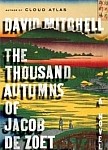David Mitchell’s Cloud Atlas is one of the most innovative books I’ve read. The problem it creates for him is that it sets a pretty high bar in the minds of many readers, myself included. So, let’s start with the fact that his latest novel, The Thousand Autumns of Jacob de Zoet, isn’t another Cloud Atlas. Let me then immediately add that shouldn’t keep anyone from reading it.
 The title character is a young Dutchman who, in the hopes of making a career and money to return home and wed his fiancée, ends up agreeing to work for five years at a Dutch East India Company trading outpost just outside Nagasaki, Japan. He arrives in July 1799, when Japan is a closed society and contact between the Dutch and the Japanese is strictly limited and controlled.
The title character is a young Dutchman who, in the hopes of making a career and money to return home and wed his fiancée, ends up agreeing to work for five years at a Dutch East India Company trading outpost just outside Nagasaki, Japan. He arrives in July 1799, when Japan is a closed society and contact between the Dutch and the Japanese is strictly limited and controlled.
While de Zoet is the title character he is neither the sole nor central focus of the work. A variety of subplots gives ample pages to Orito Aibagawa, a Japanese midwife with whom de Zoet becomes infatuated, de Zoet’s fellow employees, and various Japanese interpreters and officials. This allows Mitchell to explore the setting and tell the story from a variety of viewpoints. As with good historical fiction, The Thousand Autumns of Jacob de Zoet has political and personal intrigue, good versus evil, a romantic infrastructure, and various individual trials and tribulations.
Mitchell occasionally uses some rather annoying devices, such as alternating phrases of a person’s thought with narrative text or external dialogue. The book also starts a bit slow but Mitchell manages to capture and keep the reader’s interest. Unfortunately, the last 10 pages or so cover too broad a span of time too quickly in comparison to the rest of the book. These flaws don’t doom the book. They only mean it isn’t perfect. Yet how many books are?
The Thousand Autumns of Jacob de Zoet is a great choice for a summer read — or to enjoy any other time of year.
The present is a battleground where rival what-ifs compete to become the future “what is.”
David Mitchell, The Thousand Autumns of Jacob de Zoet







